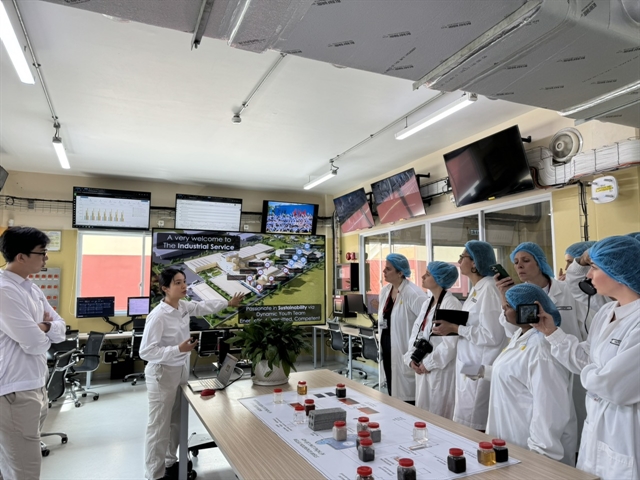International journalists have had the opportunity to experience the journey of high-quality Vietnamese coffee beans from the nurseries to the hands of farmers through programmes supporting replanting and sustainable coffee production.

Nestlé Vietnam has organised a press tour for international media to visit sustainable coffee farms in Việt Nam under the NESCAFÉ Plan model and its coffee processing factories with the aim of promoting the image of Vietnamese coffee globally.
Within a three-day journey, nearly 30 representatives from Nestlé Company across various countries, in addition to journalists and editors from international news agencies such as Bloomberg, CNBC, Business Day, SIC Television, participated in a tour of sustainable NESCAFÉ Plan models, coffee processing plants, and explored coffee culture in Đắk Lắk Province, Đồng Nai Province, and HCM City.
This was an opportunity for Nestlé Vietnam to introduce regenerative agriculture, and engagement activities with coffee farmers, sustainable coffee farming processes, as well as deep processing activities to enhance the value of Vietnamese coffee beans.
During the media trip, international journalists had the opportunity to experience the journey of high-quality Vietnamese coffee beans from the nurseries to the hands of farmers through programmes supporting replanting and sustainable coffee production. They also visited Nestlé's modern coffee processing plant, where products from high-quality Vietnamese coffee beans are created for both domestic consumers and export to international markets.
Nestlé Vietnam has been actively assisting coffee farmers across the country since 2011, in order to meet the growing demand for premium coffee both domestically and internationally. The company has been providing support in various areas, including replanting old coffee trees, promoting regenerative agriculture practices, boosting farmers' income, and integrating production, processing, and export activities. This comprehensive approach aims to enhance the value of Vietnamese coffee beans.
After 12 years of the implementation of the NESCAFÉ Plan in the Central Highlands, Nestlé Vietnam has distributed more than 73.5 million high-yield, disease-resistant coffee saplings to replant aged coffee plantations. As a result, farmers have reduced the amount of irrigation water by 40-60 per cent, as well as the amount of pesticides and chemical fertilisers by 20 per cent. Farmers also apply the intercropping technique of coffee and pepper to increase land efficiency and biodiversity while reducing environmental emissions.
As of 2023, 90 per cent of farmers within the surveyed coffee farms have adopted the naturally grown shade method, and 86 per cent of farms have diversified crops with an average of three different species. Thanks to sustainable farming practices, farmers' income has risen by 30 - 100 per cent compared to before participating in the NESCAFÉ Plan. At the same time, all coffee supplied from Viet Nam meets the Common Code for the Coffee Community (4C) standards for domestic consumption and export to 29 markets worldwide.

As part of the programme, the international media delegation also visited the Nestlé Trị An Factory, which is one of the largest coffee factories in Việt Nam, as well as Nestlé's most modern coffee processing facilities in the region.
International reporters were introduced to modern production lines following a circular process, ensuring quality throughout the sustainable coffee value chain from farming to purchasing, production, processing, export, and consumption.
The delegation gained valuable insights into Nestlé's sustainable farming practices in coffee gardens and also had the opportunity to delve into the company's production sustainability initiatives. These initiatives included exploring circular economy models and the processes involved in treating, recycling, and reusing production waste.
Annually, 60-65 per cent of wastewater is treated for reuse at the coffee processing factories. Additionally, all coffee grounds are converted into biomass energy, and the sand from the boiler is supplied to partners as a raw material for producing unburnt bricks.
Since 2015, all of Nestlé's factories in Việt Nam have reached the goal of “zero waste to landfill."
Nestlé not only produces delectable coffee cups from responsibly cultivated coffee beans but also contributes to a sustainable future.
The Vietnamese coffee industry has consistently received recognition and praise from numerous reputable international media outlets for years.
Nestlé Vietnam aims to continue popularising the image of Vietnamese coffee culture and contribute to promoting the country's coffee beans and the coffee industry in the international media. — VNS





